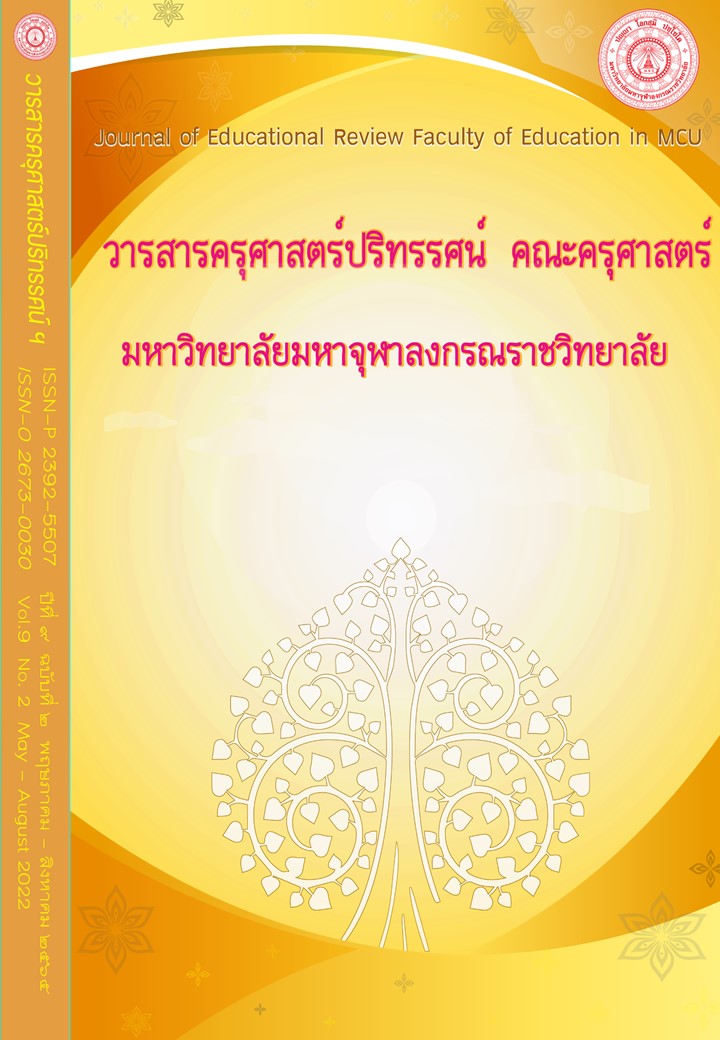DIGITAL LEADERSHIP OF THAI COMMERCIAL BANKS
Main Article Content
Abstract
The purpose of this research objectives were : 1) to study the digital leadership of Thai commercial banks; and 2) to study the problems and the obstacles affected the digital leadership of Thai commercial banks. This research was qualitative. The study selected from the senior bank executives, the middle and upper levels of 6 Thai commercial banks in Bangkok, namely: Government Savings Bank, Krungthai Bank, Siam Commercial Bank Public Company Limited, Bangkok Bank Public Company Limited, Kasikorn Bank Limited (Public); and Bank of Ayudhya Public Company Limited, the bank consultants and the businessmen, totaling of 18 key informants by in-depth interview. The results found that 1) the digital leadership in digital age management of Thai commercial banks concluded that: personnel management in the digital age was that leaders must enable the entire organization to move towards a whole new type of work. Digital knowledge and skills were: (1) to have knowledge and skills in the use of technology, (2) to comprehensive and informative management skills, (3) to communicate skills. through digital media, (4) to think, reason and decision - making skills, (5) to manage the technology organization skills; and (6) to live with others and networking skills. In creating a digital culture, leaders changed the organizational culture to be ready for the digital age, building a digital learning culture. The creation of digital learning innovation was that leaders must drive learning for people. Ability to use information was how to use “data” as “power” to drive the organization; and 2) the problems and the obstacles affected the digital leadership of Thai commercial banks were leaders face the pressure of rapidly changing technology, therefore needed to know how to adapt and develop the organization all the time.
Article Details

This work is licensed under a Creative Commons Attribution-NonCommercial-NoDerivatives 4.0 International License.
ทัศนะและความคิดเห็นที่ปรากฏในบทความในวารสารฉบับนี้ถือเป็นความรับผิดชอบของผู้เขียนบทความนั้นเพียงผู้เดียว และไม่ถือเป็นทัศนะและความรับผิดชอบของกองบรรณาธิการ
กองบรรณาธิการขอสงวนสิทธิ์ในการคัดเลือกบทความลงตีพิมพ์และจะแจ้งให้เจ้าของบทความทราบหลังจากผู้ประเมินบทความตรวจอ่านบทความแล้ว
ต้นฉบับที่ได้รับการตีพิมพ์ในวารสารครุศาสตร์ปริทรรศน์ คณะครุศาสตร์ มหาวิทยาลัยมหาจุฬาลงกรณราชวิทยาลัย ถือเป็นกรรมสิทธิ์ของคณะครุศาสตร์ มหาวิทยาลัยมหาจุฬาลงกรณราชวิทยาลัย ห้ามนำข้อความทั้งหมดหรือบางส่วนไปพิมพ์ซ้ำ เว้นเสียแต่ว่าจะได้รับอนุญาตจากมหาวิทยาลัยฯ เป็นลายลักษณ์อักษร
References
จิรพล สังข์โพธิ์ และคณะ. (2560). ภาวะผู้นำในการบริหารองค์กรยุคดิจิทัล กรณีศึกษา : องค์กรไอทีและองค์กรที่เกี่ยวข้องกับไอทีในเขตกรุงเทพมหานครและปริมณฑล. รายงานการวิจัย. วิทยาลัยนวัตกรรม มหาวิทยาลัยธรรมศาสตร์.
ชิรยุตน์ วงศ์ยุทธรัตน์. (2560). องค์ประกอบและตัวบ่งชี้ภาวะผู้นำสำหรับศตวรรษที่ 21 ของผู้บริหารสถานศึกษาสังกัดสำนักงานเขตพื้นที่การศึกษาประถมศึกษา ภาคตะวันตก. ดุษฎีนิพนธ์ปรัชญาดุษฎีบัณฑิต. มหาวิทยาลัยวงษ์ชวลิตกุล.
ทรงยศ อรัญยกานนท์. (2557). ภาวะผู้นำกับการสร้างทัศนคติเชิงบวกต่อนวัตกรรมการบริการขององค์กรปกครองส่วนท้องถิ่น. ดุษฎีนิพนธ์ปรัชญาดุษฎีบัณฑิต. มหาวิทยาลัยศิลปากร.
ทวีสันต์ วิชัยวงษ์. (2562). ภาวะผู้นำยุคใหม่และทักษะในการบริหารงานในองค์กร. วารสารแสงอีสาน มหาวิทยาลัยมหามุฏราชวิทยาลัย วิทยาลัยเขตอีสาน. 16(2). 667-680.
สิริกร อุทัยพัฒน์. (2557). ภาวะผู้นำท้องถิ่นยุคใหม่และยุทธศาสตร์เศรษฐกิจชุมชนเพื่อการพัฒนาชุมชนาธิปไตย ศึกษาเฉพาะกรณีสหกรณ์ชุมชน จังหวัดระยอง จันทบุรี และตราด. วารสารวิชาการบัณฑิตวิทยาลัยสวนดุสิต. 10(1). 51-58.
สุภางค์ จันทวานิช. (2547). วิธีการวิจัยเชิงคุณภาพ. พิมพ์ครั้งที่ 12. กรุงเทพมหานคร: สำนักพิมพ์แห่งจุฬาลงกรณ์มหาวิทยาลัย.


